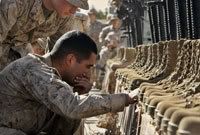Screening of “No End in Sight”

Based on over 200 hours of footage, this critically acclaimed film provides a candid retelling of the events following the fall of Baghdad in 2003 by high ranking officials such as former Deputy Secretary of State Richard Armitage, Ambassador Barbara Bodine (in charge of Baghdad during the Spring of 2003), former Chief of Staff to Colin Powell, Lawrence Wilkerson, and General Jay Garner (in charge of the occupation of Iraq through May 2003), as well as Iraqi civilians, American soldiers, and prominent analysts.
"No End in Sight" won the Special Grand Jury Prize at Sundance in 2007. Directed by Charles Ferguson, a political scientist and a member of the Council on Foreign Relations, the film provides compelling arguments about how and when the battle for Iraqi "hearts and minds" was waged.
A panel discussion evaluating the arguments set forth by the film followed the screening.
Featured Panelists:
Nicholas Cull, Professor and Director of the USC Master's in Public Diplomacy
Gregory Treverton, Fellow in National Security, Pacific Council on International Policy
Charles Ferguson, Director, "NO END IN SIGHT"
Moderated by:
Brian Katulis, Senior Fellow, Center for American Progress
This event was co-sponsored by the Center for American Progress, the USC Center on Public Diplomacy, Magnolia Pictures and Reel Progress.
Event Report
No End in Sight Screening Prompts Lively Discussion
By Vivien Pertusot
On July 24, 2007, the USC Center on Public Diplomacy and the Center for American Progress (CAP) co-sponsored an advance screening of the documentary “No End in Sight” at the Landmark Theatre in Los Angeles. A Q&A with a panel of experts and the director of the film followed the screening.
“No End in Sight” is a powerful documentary based on over 200 hours of interviews with key US officials such as Deputy Secretary of State Richard Armitage, Ambassador Barbara Bodine, and Colin Powell's former chief of staff Col. Lawrence Wilkinson as well as Iraqi civilians and journalists. Using these interviews, the film builds a case for the mistakes made by the United States following the fall of Baghdad in 2003. The film seemed to resonate with the audience who applauded loudly following the conclusion of the screening.
The panel consisted of “No End in Sight” director Charles Ferguson, Dr. Nicholas Cull, professor and director of the USC Master’s in public diplomacy, and Gregory Treverton, a senior fellow in national security at RAND. Brian Katulis, a CAP senior fellow moderated the discussion.
Mr. Ferguson explained that he intended to send two messages with the documentary. The first one was to focus people’s attention on Iraq and the Iraqi people. “The US is going to make fundamental decisions,” he said, “and I hope this film attracts people’s attention.” While Ferguson acknowledged that this was probably not the last time the United States would go to war, he hoped that next time the American public would raise two questions: “is the war necessary?” and “is the post-war carefully planned?”
Ferguson acknowledged that most of the materials presented in the film were already available in books, but that no movie had been made. “I felt it was important to tell the story in a widely accessible way,” he said. He also stressed that the film is intended to critique the execution of the war and is not an indictment of the initial decision to enter the war.
The discussion then turned to specific issues that were not directly addressed by the documentary, such as lack of intelligence, failure to take into account and adequately track Iraqi public opinion, and the reasons why the war actually broke out. Dr. Cull pointed towards the failure of the American government to learn from Vietnam and argued that anyone with a sense of historical memory should be aware that as soon as an occupation force sets foot on foreign soil, it creates problems. Mr. Treverton recalled a metaphor that one student told him after coming back from Iraq. “We’re a good football team,” he recounted his student saying, “but they asked us to dance ballet.”
The questions posed to the panelists covered various issues from possible conflict with Iran, to the role of the American press, to American motivations for entering the war.
The panelists and the audience engaged in a lively interaction. Many in the audience disagreed with Mr. Ferguson, Brian Katulis, and Gregory Treverton when they argued that the chance of a conflict with Iran was “very unlikely” and that the administration would never take such a risk. Mr. Katulis mentioned that the meeting between the US ambassador in Iraq Ryan Crocker and the Iranian delegation was “a first good step.” Mr. Treverton argued that Iran was “a problem without a solution,” and that there was no good military option.
Discussion turned to the role of the press. One audience member raised the issue of the role of the press. Professor Cull agreed. “I’ve wondered that too,” he said. His guess was that “the patriotism button” had been pushed.
One woman in the audience wanted to know what the panel thought about the plan spearheaded by Democratic Senator Joe Biden. As part of his response to the question, Brian Katulis outlined a report that CAP had recently released which outlined possible next steps for the United States. He said that CAP could not endorse Biden’s plan, because it did not allow for appropriate consultation with the Iraqi people. He went on to note that it should not be the US’s role to tell the Iraqis what to do but rather it should work with the Iraqis and with other countries to effect the most fluid political transition. Mr. Katulis acknowledged that the Iraqis might end up choosing this option, “but it should be the Iraqis’ choice.”
Visit CPD's Online Library
Explore CPD's vast online database featuring the latest books, articles, speeches and information on international organizations dedicated to public diplomacy.







